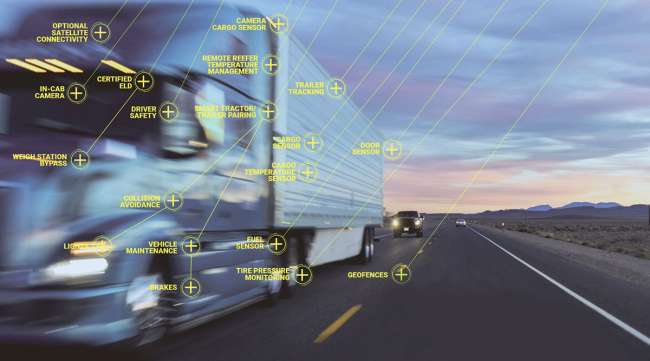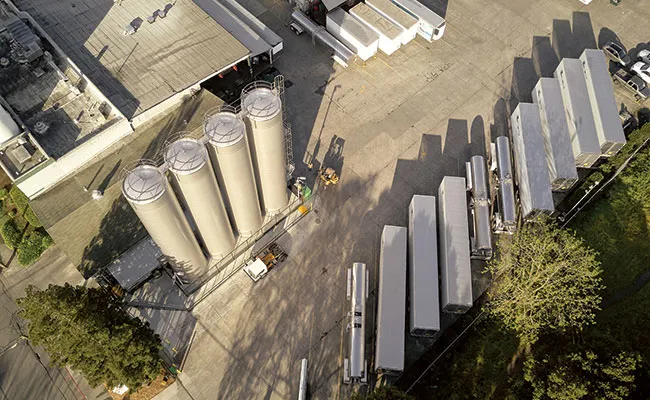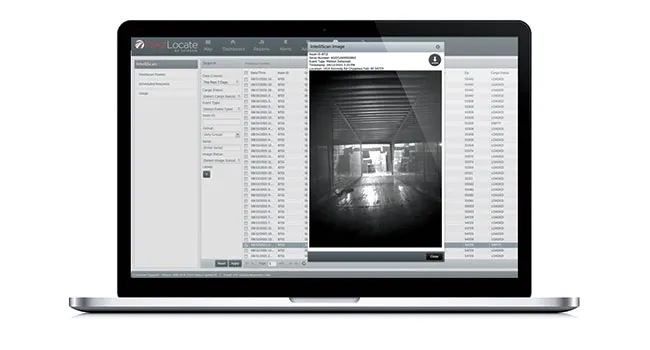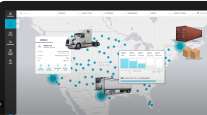Trailer Tech Capabilities Continue to Improve for Fleets

[Stay on top of transportation news: Get TTNews in your inbox.]
Trailer telematics and sensor technology continue to advance, and providers said they’re offering much more than simple track-and-trace applications. Multiple streams of information, advanced data analysis and artificial intelligence are generating insights fleets can use to improve productivity, enhance safety, support drivers and increase profitability.
“We’re at an inflection point. Carriers have gone from collecting to analyzing. They are shifting the conversation to ‘what can the data do for me’ versus ‘what can I do to get data,’” said Nada Jiddou, executive vice president and chief digital officer for Clarience Technologies, which produces Road Ready.
Every fleet has a unique set of challenges they’re looking to address, whether it is reducing unscheduled downtime via early part failure alerts or increasing revenues by charging for trailers detained too long at a shipper, said Rob Phillips, CEO of Phillips Connect. “We continue to add software features, sensors and camera technologies all the time because our customers demand creative solutions to solve their challenges. This is all relatively new territory, but it’s expanding quickly.”

Bischof
Paul Bischof, director of product management at Samsara, said data informs two key areas — business and operations. Business data includes utilization information, workflows that require location data, and state reporting for billing and revenue generation. Operational data includes advanced sensors for cargo monitoring, component health for preventative maintenance and tracking driver assignments with trailers.
“Imagine what a flashlight can provide in a dark room. It allows you to see into the space, understand what’s there, and successfully navigate it with minimal risk. Technology’s impact on the trailer market is similar,” Bischof said. “It’s creating tremendous value from a historically opaque and mechanical piece of equipment.”
Better Efficiency
In general, trailer technology has gotten better, cheaper and faster, which is driving adoption and increasing the amount of data providers and fleets collect and share, said Christopher Plaat, senior vice president and general manager for BlackBerry Radar. “We’re seeing that data is being shared more between all the interested parties across the supply chain,” he said.
Aggregating information from multiple sources can provide more meaningful insights. Gregg Plonisch, senior vice president of product management for Orbcomm, said it has gotten easier for Orbcomm’s customers to integrate with multiple wireless sensors, such as door, cargo, fuel, temperature, humidity, and brakes, lights and tires.

Trailer tracking technology also helps fleets track missing assets and reduce theft risk. (Samsara)
Road Ready created its Fus1on connectivity platform to aggregate data and collect information from multiple sources. “It doesn’t have to be a smart device. It could be another system, a shop or a factory,” Jiddou said. “We can also integrate the maintenance record, maintenance systems and parts management. It can take any data that can be transmitted. It gives carriers a single pane of glass to manage their business holistically.”
Fleets want to make data-driven decisions about their businesses, meaning they need greater visibility of the operational status of their assets and cargo. Orbcomm developed an integrated cargo camera technology that provides real-time images of the cargo inside the trailer. AI functionality can identify load status, assess trailer capacity, and report when and where load or asset damages occur.
AI analytics-based platforms are helping fleets predict future performance, get ahead of problems before they occur and identify trends. BlackBerry Radar has implemented new procedures to help companies ensure that their trailers and chassis get timely inspections done.
“It is an industry problem, and we’re able to use inspection due dates, trailer locations, and timing and mileage together to provide maintenance personnel reports of trailers that are in their yards with inspections due,” Plaat said. “A customer was able to reduce past-due inspections by 50% in the first 90 days of implementation.”

Jiddou
Jiddou said Clarience used artificial intelligence and machine learning to help customers streamline rework on trailers. “They needed to schedule resources based on when the trailer would be in a certain place and at a certain time,” she said.
By inputting three years’ worth of historical information, the technology could predict where trailers would be within a 24-hour window six months in advance with 99% accuracy. “We gave them six months of data at a time so they could schedule six months out based on that information,” Jiddou said, adding that coupling predictive maintenance and predictive arrival data holds significant potential for fleets. “Between those two, you start to really gain efficiencies within the fleet operation. Not just the trailer, but in aggregate.”
Proactive Maintenance
Al Anderson, vice president of sales and marketing for Peterson Manufacturing, which offers the PetersonPulse intelligent trailer system, said downtime and maintenance violations are among fleets’ top concerns, and trailer technology can catch equipment issues early before they become expensive, create a safety hazard or cause over-the-road violations.

Anderson
The real value comes when systems transmit specific data, Anderson explained. “Instead of just saying you have a light out, we can tell you exactly which one. That helps with diagnostics and repair times,” he said.
Phillips Connect’s Remote Pre-Check feature lets fleets test their brakes, tire pressures, temperatures, door status, lights and interior cargo status while their trailers are parked. “This feature enables the evaluation of trailers earmarked for drivers and those requiring maintenance attention before dispatch. These offerings have the power to revolutionize operations,” Phillips said.
Phillips said information related to tire pressure, including when a tire inflation system is working too hard to overcome an air leak, lets dispatchers know if they need to send a driver or a mechanic to the trailer before loading it up, which saves money and reduces downtime. He added that a robust maintenance program can keep trailers in good health, allowing for longer usage. “With the costs of new trailers on the rise, it’s more crucial than ever to prioritize proper maintenance to extract maximum value from investments,” he said.
Samsara has released new software enhancements for trailers equipped with refrigerated units, like actionable alerts to better configure and manage reefer notifications and a new integration with Thermo King’s TracKing Telematics to give fleets more visibility, flexibility and control over temperature-sensitive trailer operations.
For drivers picking up a trailer, Spireon’s TrailerView shows drivers the exact location of empty trailers on their phones or mobile devices, saving them time. “Drivers can also search for any trailer by VIN, check trailer load status, and view a comprehensive list of available assets right at their fingertips,” said Roni Taylor, senior vice president of strategy and business development at Spireon, a Solera company.
BlackBerry Radar sends a link to drivers’ devices to help them navigate to a specific trailer in the yard, and Plaat said one of the most basic but important uses for trailer tracking is automatic yard checks, which provide real-time data, eliminate manual processes and allow fleets to use employees for more meaningful tasks.
Operational Improvements
Labor is an ongoing concern, which led to Spireon’s managed services offering. Spireon operations analysts handle reporting and analytics to help ease workforce challenges for fleets. “This managed services solution includes a dedicated team responsible for managing reports, conducting yard checks, running detention reports and handling other tasks traditionally performed by in-house staff,” Taylor said.

Telematics has allowed fleets to better manage trailer inventory and storage. (Spireon)
Smart technology is improving trailer utilization and helping fleets optimize the number and types of assets they need to own, which Plaat said has become more important due to equipment shortages and higher prices. “We have a use case of a customer that was able to put off $2 million in purchases after implementing trailer tracking because they could use their current equipment more efficiently,” he said.
Spireon has introduced IntelliScan ProView, an enhanced cargo sensor that changes the carrier’s view of available cargo space with 99% accurate load status plus the trailer’s used cubic volume and floor space percentages. With the added insights, truckload carriers can see open space in their trailers for additional backhaul opportunities, less-than-truckload carriers can better plan their trailer load cube and move more freight per trailer, and private fleets can manage inventory in storage trailers and identify backfill opportunities, Taylor said.
Phillips Connect can determine if a trailer is really loaded or used for storage by detecting dunnage. “This level of insight adds another layer of efficiency, allowing our customers to maximize the use of their assets and optimize their operations even further,” Phillips said.
Trailer tracking technology also helps fleets track missing assets and reduce theft risk. With Orbcomm, information on trailer break-ins or unauthorized use can be identified, reported through alerts, and documented through door sensors and automated reporting, including when and where the security incident occurred and the duration of the door open event.

Transport Topics' Seth Clevenger, Michael Freeze and Mike Senatore dissect the new Top 100 list of the largest private carriers, including how fleets are adapting to this softened market. Tune in above or by going to RoadSigns.ttnews.com.
Providers said production remains strong, and they’ve overcome most supply chain challenges. Plonisch said Orbcomm diversified manufacturing to help alleviate supply chain issues and meet customer demand. “At this time, we believe we have moved past any hurdles in terms of production,” he said.
Phillips Connect has turned to nearshoring whenever feasible and established manufacturing operations in Mexico, Phillips said.
Going forward, Plonisch believes more fleets of any size will be able to leverage smart trailer solutions to track their assets, especially as price points become more accessible and telematics becomes more widely adopted. “We envision more advanced video technology, further integrations with OEMs and partners and more AI analytics to deliver a higher level and a broader set of data insights and to support enhanced use cases,” he said.
With more data elements, fleets and their technology providers will be able to combine them in new and innovative ways to improve operations. “Keep in mind, the impact of smart trailers goes beyond the trailer, as this one component is part of a larger orchestra of fleet operations,” Bischof said. “Technology companies who recognize that it will ‘take a village’ to partner, consolidate and approach this market with an end-to-end view of fleet operations are poised to benefit.”
Want more news? Listen to today's daily briefing below or go here for more info:




